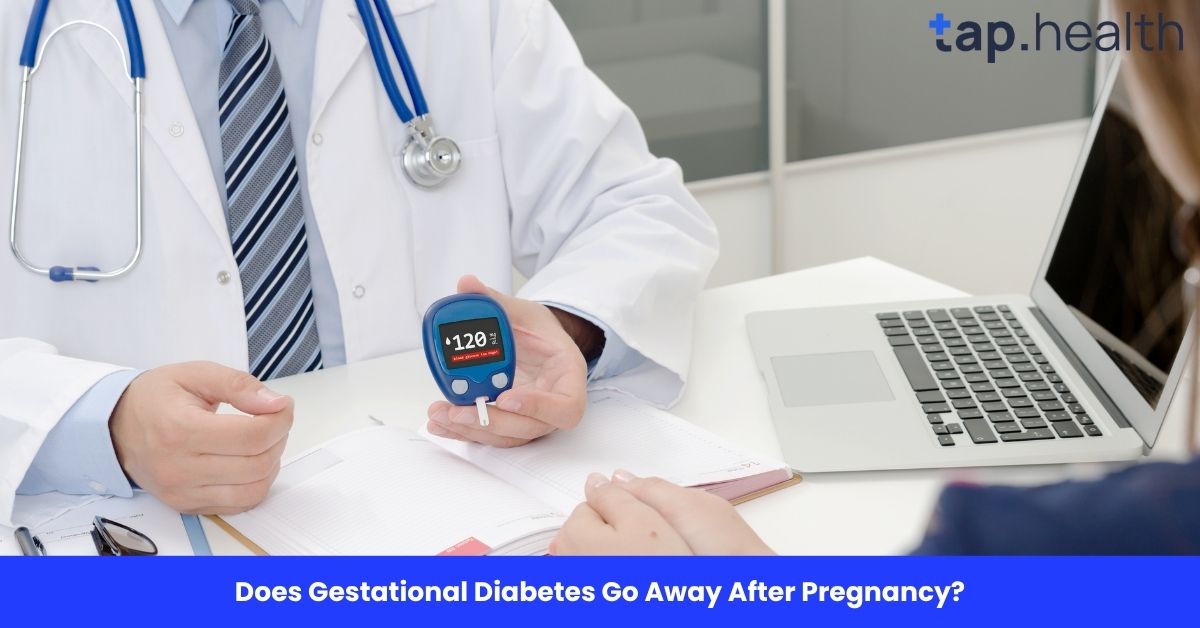Gestational diabetes is a condition that develops during pregnancy and affects how the body processes glucose (sugar). Many women who experience gestational diabetes wonder if the condition will go away after they deliver their baby. The simple answer is that for most women, gestational diabetes does go away after pregnancy. However, the situation is more complex, and there are several important factors to consider.
In this blog post, we will dive deep into whether gestational diabetes goes away after pregnancy, what it means for your health, and the long-term effects it may have. We will also discuss how you can manage your health after delivery and reduce the risk of future complications.
What is Gestational Diabetes?
Before we discuss if gestational diabetes goes away after pregnancy, let’s first understand what it is and how it affects the body.
Gestational diabetes is a type of diabetes that occurs during pregnancy when the body is unable to produce enough insulin to manage blood sugar levels. Insulin is a hormone that helps move sugar from the bloodstream into cells, where it’s used for energy. When the body cannot produce enough insulin during pregnancy, blood sugar levels rise, leading to gestational diabetes.
It is different from other types of diabetes, such as Type 1 and Type 2 diabetes, because it develops only during pregnancy. It is usually diagnosed between the 24th and 28th week of pregnancy and can be managed with diet, exercise, and sometimes medication.
Does Gestational Diabetes Go Away After Pregnancy?
1. The Immediate Postpartum Period
In most cases, gestational diabetes goes away after delivery. After the baby is born, the placenta is no longer present, and the body’s insulin needs change. As a result, blood sugar levels generally return to normal within a few days or weeks after childbirth. For many women, this means that their gestational diabetes resolves after delivery.
However, it’s important to note that just because gestational diabetes goes away after pregnancy doesn’t mean you are no longer at risk of future health problems.
2. Why Does Gestational Diabetes Go Away?
Gestational diabetes is caused by hormonal changes that occur during pregnancy. The placenta produces hormones that can interfere with insulin, leading to insulin resistance. After childbirth, the placenta is delivered, and these hormones leave the body, which helps restore normal insulin function.
This hormonal shift is why many women find that their blood sugar levels return to normal after the birth of their child. But, this does not mean that gestational diabetes is a one-time issue. Some women may continue to have insulin resistance or may develop other forms of diabetes later in life.
Can Gestational Diabetes Come Back?
While gestational diabetes may go away after pregnancy, there is a possibility that it can return in future pregnancies. In fact, women who have had gestational diabetes in one pregnancy are at a higher risk of developing it again in subsequent pregnancies.
Additionally, gestational diabetes increases the risk of developing Type 2 diabetes later in life. According to several studies, women who had gestational diabetes are more likely to develop Type 2 diabetes within 5 to 10 years after pregnancy. This is why it’s crucial to continue monitoring blood sugar levels after delivery.
1. Increased Risk of Type 2 Diabetes
Studies have shown that women who had gestational diabetes have a higher risk of developing Type 2 diabetes later in life. This risk is particularly high for women who are overweight or obese, but it can also affect women with a normal weight.
2. Why Does This Happen?
Even though gestational diabetes resolves after pregnancy, the body may still have underlying issues with insulin resistance. Insulin resistance can persist after pregnancy, increasing the chances of developing Type 2 diabetes in the future. Lifestyle factors like diet and exercise play a significant role in preventing the onset of Type 2 diabetes.
How Can You Manage Gestational Diabetes After Pregnancy?
While gestational diabetes may go away after childbirth, it’s important to take steps to manage your health and reduce the risk of future complications. Here are some strategies to keep your blood sugar levels in check after pregnancy:
1. Postpartum Blood Sugar Testing
It’s crucial to get your blood sugar levels tested 6 to 12 weeks after delivery. This will help determine whether your blood sugar has returned to normal or if you have developed Type 2 diabetes. Regular testing is important even if you feel fine, as gestational diabetes doesn’t always show immediate symptoms.
2. Maintain a Healthy Diet
After delivery, following a balanced diet is essential to keep blood sugar levels in check. Aim for a diet rich in whole grains, vegetables, lean proteins, and healthy fats. Reducing processed sugars and carbohydrates can help maintain stable blood sugar levels and prevent future complications.
3. Exercise Regularly
Physical activity is one of the best ways to improve insulin sensitivity and reduce the risk of Type 2 diabetes. Regular exercise helps the body use insulin more effectively, which can lower blood sugar levels. Aim for at least 30 minutes of moderate exercise, such as walking or swimming, most days of the week.
4. Maintain a Healthy Weight
Being overweight or obese is a significant risk factor for developing Type 2 diabetes. Losing excess weight through a combination of healthy eating and regular exercise can help prevent the onset of Type 2 diabetes. A healthy weight also supports better overall health and well-being.
5. Breastfeeding
Breastfeeding is not only beneficial for your baby, but it may also help improve your insulin sensitivity and lower your risk of developing Type 2 diabetes. Studies suggest that breastfeeding may help regulate blood sugar levels after pregnancy.
How to Prevent Gestational Diabetes in Future Pregnancies
Although you can’t completely eliminate the risk of gestational diabetes in future pregnancies, there are steps you can take to reduce the chances of developing it again:
1. Plan Your Pregnancy
If you had gestational diabetes in a previous pregnancy, talk to your doctor before trying to conceive again. They can help you plan a healthy pregnancy by guiding you on achieving a healthy weight, managing any existing health conditions, and monitoring your blood sugar levels.
2. Stay Active
Keeping active between pregnancies is crucial for maintaining healthy blood sugar levels. Regular physical activity helps to maintain a healthy weight, improves insulin sensitivity, and reduces the risk of developing gestational diabetes in subsequent pregnancies.
3. Follow a Healthy Lifestyle
Eating a balanced diet, staying active, and maintaining a healthy weight are key to preventing gestational diabetes in future pregnancies. It’s essential to make these lifestyle choices a habit, not just during pregnancy but throughout your life.
Real-Life Scenario
Consider a woman who was diagnosed with gestational diabetes at 28 weeks of pregnancy. She managed her condition with a balanced diet, regular exercise, and insulin when needed. After delivery, her blood sugar levels returned to normal. However, during a routine checkup one year later, she was found to have slightly elevated glucose levels, highlighting the importance of continued monitoring even after pregnancy.
Expert Contribution
Dr. Anjali Mehta, an endocrinologist, notes: “Gestational diabetes is a wake-up call for long-term metabolic health. While it often disappears after childbirth, women who experienced it should be aware of their higher risk for type 2 diabetes and take preventive measures.”
Recommendations Grounded in Proven Research and Facts
- Regular Screening: Women with a history of gestational diabetes should undergo glucose tolerance testing 6–12 weeks postpartum and at least every 1–3 years afterward.
- Healthy Lifestyle: Maintaining a balanced diet and engaging in regular physical activity can significantly reduce the risk of developing type 2 diabetes.
- Weight Management: Achieving and maintaining a healthy weight after pregnancy can help regulate blood sugar levels.
- Medical Guidance: Consult healthcare providers for individualized advice on nutrition, exercise, and monitoring.
Frequently Asked Questions (FAQs) on Does Gestational Diabetes Go Away After Pregnancy?
1. Does gestational diabetes go away after delivery?
Yes, for most women, gestational diabetes goes away after delivery. After childbirth, hormonal changes cause blood sugar levels to return to normal. However, gestational diabetes increases the risk of developing Type 2 diabetes later in life.
2. Will I get gestational diabetes again in future pregnancies?
If you’ve had gestational diabetes in a previous pregnancy, you’re more likely to develop it again in future pregnancies. However, by managing your health through proper diet, exercise, and monitoring, you can reduce your risk.
3. Can gestational diabetes turn into Type 2 diabetes?
Yes, women who have had gestational diabetes are at a higher risk of developing Type 2 diabetes later in life. Regular monitoring of blood sugar levels and maintaining a healthy lifestyle can help reduce the risk of this transition.
4. How long after pregnancy should I get tested for gestational diabetes?
You should get tested for gestational diabetes 6 to 12 weeks after delivery. This will help determine whether your blood sugar levels have returned to normal or if you have developed Type 2 diabetes.
5. How can I lower my risk of developing diabetes after pregnancy?
You can lower your risk by eating a healthy diet, exercising regularly, maintaining a healthy weight, breastfeeding, and having regular check-ups to monitor your blood sugar levels.
6. Can gestational diabetes affect my baby long-term?
While gestational diabetes typically resolves after pregnancy, babies born to mothers with gestational diabetes may have a higher risk of obesity, diabetes, and developmental delays later in life.
7. Does breastfeeding help after gestational diabetes?
Yes, breastfeeding can help improve insulin sensitivity and may reduce the risk of developing Type 2 diabetes later in life. It’s also beneficial for both you and your baby’s health.
In conclusion, while gestational diabetes typically goes away after pregnancy, it’s important to take steps to manage your health and reduce the risk of developing Type 2 diabetes later in life. Regular monitoring, a healthy diet, exercise, and weight management are key strategies to ensure that gestational diabetes doesn’t lead to further complications in the future.



